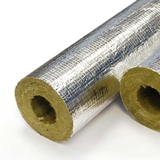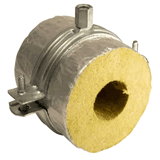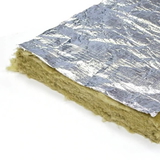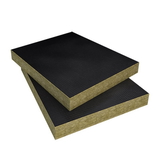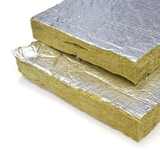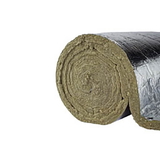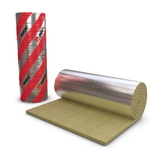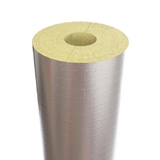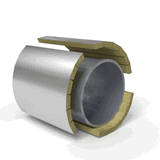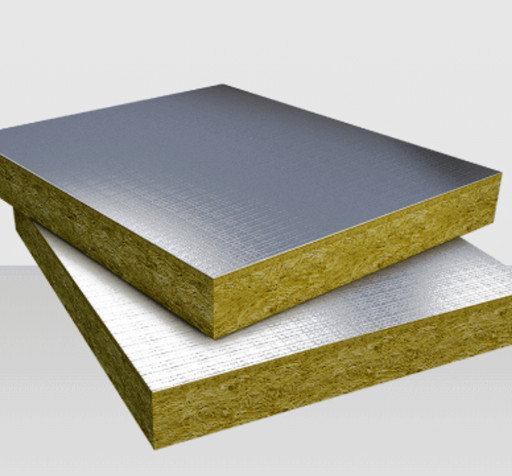- Blogs
- The Essential Guide to Rockwool HVAC Insulation
The Essential Guide to Rockwool HVAC Insulation

Rockwool, a leading manufacturer of insulation materials, offers a range of products specifically designed for HVAC systems. With practical tips, this guide equips you with the knowledge needed to make informed decisions about Rockwool insulation in Rockwool Pipe insulation and Duct insulation. Read on to learn more about the Rockwool HVAC systems and determine if it meet your specifications.
What is Rockwool insulation?
Rockwool insulation, sometimes called mineral wool insulation, is a form of thermal and acoustic insulation material frequently utilised in many applications, including Rockwool Pipe insulation and Rockwool Duct insulation. It is manufactured from natural basalt rock, which is melted and spun into fine fibres.
Let's specify two common Rockwool products:
1. Rockwool Pipe insulation![]()
One form of insulation material used particularly for insulating pipes in HVAC systems is called rockwool pipe insulation. It is made of Rockwool, a stone wool insulation made of natural stone. The insulation is offered as pre-formed cylindrical tubes that fit readily around pipes and also flexible ductwrap.
Insulation around pipes and ductwork helps to keep temperatures stable, minimise heat loss, and boost the energy effectiveness of the HVAC system. It also serves as a barrier, reducing the heat transferred from the pipe to its surroundings.
Composition and Characteristics
Due to several fundamental properties, rockwool pipe insulation is a well-liked option for insulating pipes in HVAC systems. Its low heat conductivity is one of its many noteworthy qualities. It successfully lowers heat transmission, assisting in sustaining the correct temperatures inside the pipes and avoiding heat loss. This quality helps HVAC systems operate more cost- and energy-effectively.
It generally ranges from medium to high density. The insulating material's longevity and compression resistance are influenced by its density. Increased strength and stiffness from higher density enable the insulation to endure external stresses without losing its insulating qualities or deforming.
Benefits of Rockwool Pipe Insulation
When used in pipes, Rockwool pipe insulation offers several benefits. Thus, if you're looking for an insulation solution worth your investment, try rockwool pipe insulation. To get started, it efficiently lowers heat transmission, preventing heat gain or loss from the pipes. The HVAC system maintains appropriate temperatures and thermal performance to enhance energy efficiency and lower heating or cooling expenses.
Secondly, the superior thermal insulation capabilities of Rockwool Pipe Insulation significantly reduce energy loss from the pipes. Over time, it results in considerable energy savings because it minimises the need for continual heating or cooling by inhibiting heat transmission.
In addition, by keeping the temperature above the dew point, Rockwool Pipe Insulation aids in preventing condensation on the pipe's surface. This reduces the chance of moisture-related problems such as corrosion, mould growth, and pipe material degradation. It promotes a longer lifespan for the pipes and aids in maintaining their integrity.
Furthermore, it has a high melting point and low combustibility, making it naturally fire-resistant. It serves as a barrier in the case of a fire, preventing the spread of the flames and enhancing the HVAC system's overall fire protection. This is especially significant in contexts like commercial and industrial ones where fire safety is essential.
Applications of Rockwool Pipe Insulation
From the above context, we can all concur that Rockwool Pipe Insulation is a powerful type of insulation; But where can we use it? There are several uses for rockwool pipe insulation in various situations and industries. Firstly, it is used on pipes that carry hot or cold substances like steam, water, or refrigerants. It provide thermal management and energy savings by insulating these pipes by preventing heat gain or loss.
Next, it is used in manufacturing facilities, power generation facilities, and chemical processing plants in industrial environments. To ensure efficiency and safety, it is used to insulate pipes used in numerous operations, including the conveyance of fluids.
To add to the list, it is frequently used in residential and commercial structures to insulate HVAC ducting, heating systems, and plumbing pipes. Limiting heat input or loss aids in maintaining stable temperatures, lowers energy usage, and enhances occupant comfort.
Additionally, it is used in cold storage and refrigeration systems. It gives pipes transporting refrigerants insulation, which helps to maintain low temperatures and stop energy loss, assuring the effectiveness of refrigeration operations.
2. Rockwool Duct Insulation![]()
Rockwool Duct insulation is a type of insulation specifically designed for insulating HVAC ductwork. It is constructed of mineral wool obtained from natural stone. It is placed inside or outside the ductwork and is available in various shapes, including stiff boards and flexible blankets. This type of insulation offers heat insulation, lowers energy loss, manages condensation, improves fire safety, and aids in reducing noise transmission via ducting.
Properties
What sets rock wool duct insulation apart from other common insulators are its properties. It is a great option for insulating HVAC ductwork since it includes several essential characteristics.
Above all it t helps reduce energy consumption by reducing heat gain or loss from the pipe or ducting. It makes HVAC systems more efficient, minimising the demand for continuous heating or cooling and consuming less energy. The insulation has excellent sound absorption properties, minimising noise transmission via the ducting. This increases acoustic comfort within the building and reduces noise transmission between various regions.
Moreover, it is noted for its resilience and resistance to wear and tear. It can endure the rigours of HVAC system operation while maintaining its insulating characteristics over time, assuring long-term performance.
Finally, it is moisture resistant, reducing water absorption and mould or mildew formation. This preserves the insulation's integrity and contributes to a healthier interior environment. These properties have a direct benefit to users, hence making it an effective insulation.
Application of Rockwool Duct Insulation
Rockwool duct insulation has several uses in various industries and points of interest. In heating, ventilation, and air conditioning (HVAC) systems, rockwool duct insulation is widely utilised.
Next, it is widely used in commercial structures such as offices, hospitals, schools, and retail malls. Insulating the ductwork and decreasing heat transmission helps manage temperature, reduce energy usage, and increase occupant comfort. Industrial places like manufacturing factories, power plants, and refineries use Rockwool Duct insulation.
It insulates ductwork for numerous operations such as ventilation, exhaust systems, and equipment cooling.
Final Thoughts
Thus, Rockwool HVAC insulation line of products offers numerous benefits and applications. Its thermal properties, non-combustible nature, and compliance with building regulations make it a reliable choice for HVAC systems.
Case studies highlight successful applications in various industries, demonstrating its effectiveness in improving energy efficiency, reducing noise transmission, and ensuring fire safety. Also, professionals can use this insulation to meet building regulations, enhance thermal performance, and provide occupants with a safe and comfortable environment. Take the first step towards efficient insulation solutions! Visit our site today to explore a wide range of high-quality insulation products.
FAQs
Q: Are there case studies on successful Rockwool HVAC insulation projects?
A: Yes, on the Rockwool official website, under the Rockwool HVAC Systems Guide section, you can find plenty of case studies that detail successful projects where Rockwool insulation was used.
Q: Are there any installation guides available for Rockwool solutions?”
A: Yes, installation guides for Rockwool solutions are readily available on Rockwool UK's official website. These guides provide detailed steps to help users maximise the benefits of their chosen Rockwool products.
Q: Is there a calculator or tool that helps estimate savings when using Rockwool HVAC insulation?”
A: Yes, Rockwool UK provides a range of technical tools and resources, including a savings calculator. This calculator helps you identify potential energy savings and cost reductions, making it easier to specify Rockwool for your project.
Q: Could you tell me more about the acoustic benefits of Rockwool HVAC insulation?
A: Rockwool HVAC insulation is known to provide excellent acoustic solutions. It significantly reduces noise transmission through the HVAC system, enhancing the comfort and well-being of building occupants. More on this can be found in the new HVAC systems guide available on the website.
Q: Is Rockwool used only for thermal insulation in HVAC systems?
A: Apart from thermal insulation, Rockwool products are also designed for fire safety and acoustic insulation within HVAC systems. The comprehensive insulation range of Rockwool solutions is designed to cater to all these requirements.
Q: Which Rockwool products are good for my HVAC system?
A: Rockwool offers a wide range of products, including those specifically designed for HVAC systems. The HVAC range includes but is not limited to, Rocklap H&V and Rockwool Ductwrap and Ductslab. More details on these can be found in the Rockwool UK HVAC Systems Guide.
Q: Why should I choose Rockwool solutions for HVAC insulation?
A: Rockwool solutions for HVAC insulation are highly recommended because they meet the guide to HVAC standards and provide thermal comfort. Rockwool offers a wide range of insulation options and provides technical tools and resources for easy installation and optimal performance.
Q: Are there any technical tools and resources available for specifying Rockwool insulation within HVAC systems?
A: Yes, Rockwool provides technical tools and resources for specifying insulation within HVAC systems. This includes the Rockwool Red Book, which is a comprehensive guide for specifying Rockwool insulation in any application. This guide covers the latest trends, technical specifications, and best practices for using Rockwool insulation in HVAC systems.
Q: What are 'EN tested fire duct systems' and how does Rockwool insulation comply with them?
A: 'EN tested fire duct systems' refer to fire safety standards for ventilation ducts. Rockwool insulation has been tested and certified to comply with these fire safety standards, ensuring that your HVAC system is well protected against fire hazards.
Q: Can Rockwool HVAC insulation be used in all HVAC systems?
A: Yes, Rockwool insulation can be specified for any application within HVAC systems. Whether it is for thermal comfort, energy efficiency, or acoustic performance, Rockwool offers solutions that meet the requirements of various HVAC systems.

Samuel Hitch
Managing Director
Buy Insulation Online.
Leave A Reply
Your feedback is greatly appreciated, please comment on our content below. Your email address will not be published. Required fields are marked *
